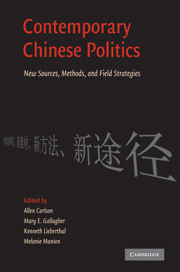Book contents
- Frontmatter
- Contents
- Tables and Figures
- Contributors
- Abbreviations
- Introduction
- Part I Sources
- Part II Qualitative Methods
- Part III Survey Methods
- 10 A Survey of Survey Research on Chinese Politics
- 11 Surveying Prospects for Political Change
- 12 Using Clustered Spatial Data to Study Diffusion
- 13 Measuring Change and Stability over a Decade in the Beijing Area Study
- 14 Quantitative Research and Issues of Political Sensitivity in Rural China
- Reflections on the Evolution of the China Field in Political Science
- Glossary
- References
- Index
13 - Measuring Change and Stability over a Decade in the Beijing Area Study
Published online by Cambridge University Press: 05 June 2012
- Frontmatter
- Contents
- Tables and Figures
- Contributors
- Abbreviations
- Introduction
- Part I Sources
- Part II Qualitative Methods
- Part III Survey Methods
- 10 A Survey of Survey Research on Chinese Politics
- 11 Surveying Prospects for Political Change
- 12 Using Clustered Spatial Data to Study Diffusion
- 13 Measuring Change and Stability over a Decade in the Beijing Area Study
- 14 Quantitative Research and Issues of Political Sensitivity in Rural China
- Reflections on the Evolution of the China Field in Political Science
- Glossary
- References
- Index
Summary
Descriptive statistics from representative sample surveys conducted in mainland China provide a static picture that is often soon overtaken by the impact of rapid socioeconomic change. The importance of longitudinal data generally, but especially in such a context, cannot be overstated. Survey researchers seem to recognize this: as discussed in Chapter 10, a remarkable number of surveys conducted in mainland China have a longitudinal component. By far the most ambitious of these is the Beijing Area Study (BAS), an ongoing annual representative sample survey of Beijing residents, designed and conducted since 1995 by the Research Center for Contemporary China (RCCC) at Peking University. This chapter begins with an introduction to the underlying vision and goals of the BAS, as conceived in the early 1990s. It then turns to specific issues of questionnaire content, sampling design, and survey implementation. We pay particular attention to the challenges and changes faced over the first decade of the BAS; major changes in sampling were made in 2007, however, and we review these here. For the most part, we do not present survey findings, except to illustrate particular points in the discussion of methods.
Vision and Goals
The BAS focuses mostly on socioeconomic rather than explicitly political issues. Indeed, “politics” does not even appear in the full project title: Beijing Annual Survey of Social and Economic Development (北京社会经济发展年度调查). This is not simply because political topics are more sensitive than social or economic topics, with implications for survey implementation, although this is certainly a serious consideration for a project with a long projected life span as opposed to a one-shot effort. It also has much to do with the context of the early 1990s, when the vision of the BAS initially emerged. After 1992, with a renewed policy emphasis promoted by Deng Xiaoping on the role of the private sector in the economy, the pace of economic and accompanying social change in China increased rapidly. In the new historic period of “reform and opening,” the broad goal of the BAS designers was to capture, with a continually updated dataset, the impact of the major ongoing reforms on the everyday lives of ordinary Chinese.
- Type
- Chapter
- Information
- Contemporary Chinese PoliticsNew Sources, Methods, and Field Strategies, pp. 236 - 245Publisher: Cambridge University PressPrint publication year: 2010



